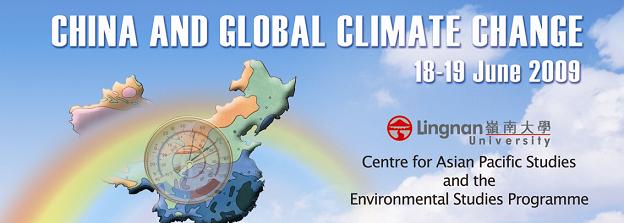
Event Title
Conference on China and Global Climate Change : Reconciling International Fairness and Protection of the Atmospheric Commons
Location
AM310, Lingnan University
Start Date
19-6-2009 9:00 AM
End Date
19-6-2009 10:30 AM
Language
English
Description
Climate change is a global challenge and requires a global solution. In late 2007, governments adopted the Bali Roadmap, launching negotiations toward a new global climate agreement. Among nations with large CO2 emissions, only China, sustains a rapid economic growth dependent on the expanded use of carbon-intensive coal. The role of China in post- Kyoto climate negotiations is therefore critical to the international effort to combat climate change and global warming.
In fact, China ratified the UNFCCC in January 1993 and was among the first ten countries to become Convention Parties. Over the years, China has been actively participating in climate change regime and has taken a multiple-track approach in climate change negotiations, including the UN Convention/Protocol hard law path, the APP partnership, multilateral and bilateral climate cooperation agreements, G8 and APEC processes and more recently, the US-led Major Economies Meetings.
China’s FCCC/Kyoto Protocol participation draws largely from the previous experience of participating in the Montreal Protocol on substances that deplete ozone layer. To China, participating in climate change negotiations is a legitimate access to assistance and technology. Institutionally, China’s led agency in climate change affairs has been shifted from China Meteorological Administration (science), Ministry of Environmental Protection (environment) to Ministry of Foreign Affairs (diplomacy) and National Development and Reform Commission (economic interests).
Internationally, China’s multiple-track approach further raises its profile and boost negotiations for the post-2012 regime both inside and outside the UN process. The question that what does China want from the post-Kyoto climate policy depends entirely on how urgent China perceives climate change to be, and how badly it wants the world to agree a solution to the problem.
Document Type
Presentation
Recommended Citation
Lee, H.-C. (2009). Do all roads lead to Copenhagen? The case of China’s participation in the post-2012 climate change regime. In China and global climate change: Proceedings of the conference held at Lingnan University, Hong Kong, 18-19 June 2009 (pp. 323-329). Centre for Asian Pacific Studies and the Environmental Studies Programme, Lingnan University, Hong Kong.
Included in
Do all roads lead to Copenhagen? The case of China’s participation in the post-2012 climate change regime
AM310, Lingnan University
Climate change is a global challenge and requires a global solution. In late 2007, governments adopted the Bali Roadmap, launching negotiations toward a new global climate agreement. Among nations with large CO2 emissions, only China, sustains a rapid economic growth dependent on the expanded use of carbon-intensive coal. The role of China in post- Kyoto climate negotiations is therefore critical to the international effort to combat climate change and global warming.
In fact, China ratified the UNFCCC in January 1993 and was among the first ten countries to become Convention Parties. Over the years, China has been actively participating in climate change regime and has taken a multiple-track approach in climate change negotiations, including the UN Convention/Protocol hard law path, the APP partnership, multilateral and bilateral climate cooperation agreements, G8 and APEC processes and more recently, the US-led Major Economies Meetings.
China’s FCCC/Kyoto Protocol participation draws largely from the previous experience of participating in the Montreal Protocol on substances that deplete ozone layer. To China, participating in climate change negotiations is a legitimate access to assistance and technology. Institutionally, China’s led agency in climate change affairs has been shifted from China Meteorological Administration (science), Ministry of Environmental Protection (environment) to Ministry of Foreign Affairs (diplomacy) and National Development and Reform Commission (economic interests).
Internationally, China’s multiple-track approach further raises its profile and boost negotiations for the post-2012 regime both inside and outside the UN process. The question that what does China want from the post-Kyoto climate policy depends entirely on how urgent China perceives climate change to be, and how badly it wants the world to agree a solution to the problem.

